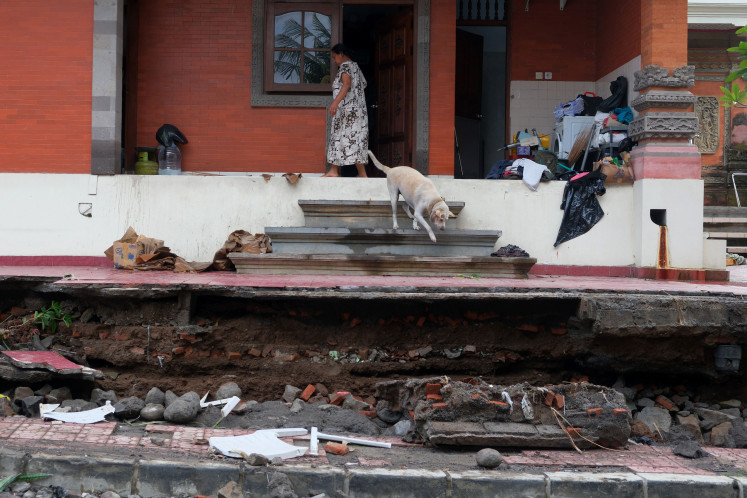Popular Reads
Top Results
Can't find what you're looking for?
View all search resultsPopular Reads
Top Results
Can't find what you're looking for?
View all search resultsAvian flu detected in cockfighting village
A local man suspected of having bird flu rested in his home in Jagapati village, Badung, a place well-known for cockfighting, while officials continued to cull fowls in the area
Change text size
Gift Premium Articles
to Anyone
A local man suspected of having bird flu rested in his home in Jagapati village, Badung, a place well-known for cockfighting, while officials continued to cull fowls in the area.
Putu Pranayoga, 20, was resting in his bedroom when The Jakarta Post visited. Dwi Tresna Ningsih, a field doctor who has been treating and observing Putu, said he began showing symptoms of influenza Monday, just a few days after the report of a possible bird flu outbreak in the area.
"We've given him Tamiflu *the medicine required to treat bird flu suspects* and we'll continue to observe him every five hours," Tresna said Tuesday.
She said Putu seemed to be getting better but declined to rule out the possibility of bird flu, saying that she was still waiting for results of Putu's blood test, which was sent to Jakarta on Monday.
"We can't know for sure until we've received the results of his blood tests, which we will get in two weeks," she said.
It is the latest resurgence of the much-dreaded avian flu in Bali since the death of a 29-year-old woman, who allegedly died after being infected by the H5N1 virus on August 2007.
The virus was first detected on Wednesday last week, when a villager reported the sudden and nearly simultaneous death of 15 fowls in the area to the Badung Animal Husbandry and Fisheries Agency.
The dead fowl tested positive of bird flu.
The agency has since culled as many as 133 fowls in the district, with further culling to continue in the days to come until all the villages' estimated 180-fowl population has been eliminated.
"We have culled 133 fowls so far, including the 40 we aim to finish off today. We'll continue the elimination for as long as it takes," said I Made Badra, head of the Badung Animal Husbandry and Fisheries Agency, in Jagapati on Tuesday.
According to Badra, the resurgence of the virus was related to the wet season, which may have weakened a certain fowl's immune system enough to catch bird flu, quickly spreading to others.
Another possibility, he said, was the transportation of an infected chicken from Java to Jagapati to use for cockfighting.
The Bali government has banned unlicensed live animal transportation into Bali and cockfighting, but the latter remains a staple in the island due to the religious and traditional nature of the so-called sport.
On the other hand, the ban on animal transportation seems to have been fully implemented since the detection of rabies virus late last year. However, Badra said there was a good chance that infected fowls escaped detection because they might have been transported before the rabies scare.
"For now we'll continue to urge the public to not transport live animals into Bali," he said.
"We should all really learn from what happens to people who come in contact with sick animals," he said, referring to the alleged death of the 29-year-old woman from bird flu and the recent alleged deaths from rabies.










